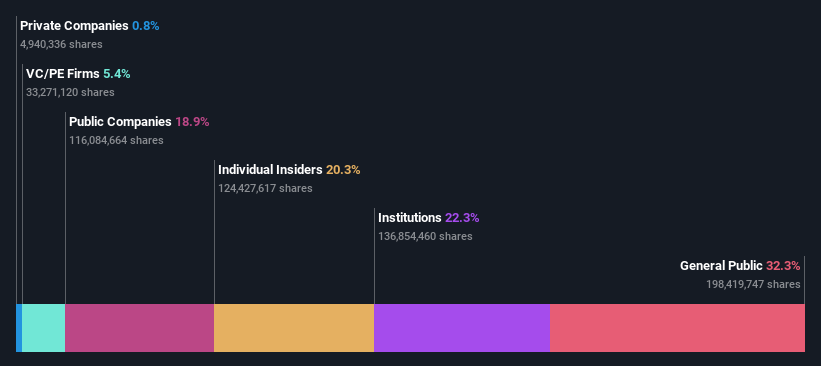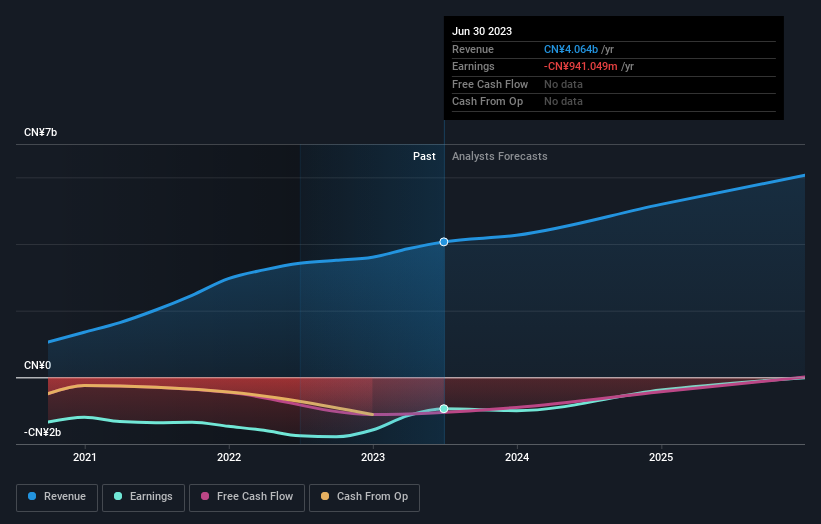Zhihu Inc.'s (NYSE:ZH) top owners are individual investors with 32% stake, while 22% is held by institutions
Key Insights
Zhihu's significant individual investors ownership suggests that the key decisions are influenced by shareholders from the larger public
A total of 7 investors have a majority stake in the company with 51% ownership
To get a sense of who is truly in control of Zhihu Inc. (NYSE:ZH), it is important to understand the ownership structure of the business. We can see that individual investors own the lion's share in the company with 32% ownership. That is, the group stands to benefit the most if the stock rises (or lose the most if there is a downturn).
Institutions, on the other hand, account for 22% of the company's stockholders. Institutions often own shares in more established companies, while it's not unusual to see insiders own a fair bit of smaller companies.
Let's delve deeper into each type of owner of Zhihu, beginning with the chart below.
See our latest analysis for Zhihu
What Does The Institutional Ownership Tell Us About Zhihu?
Institutional investors commonly compare their own returns to the returns of a commonly followed index. So they generally do consider buying larger companies that are included in the relevant benchmark index.
We can see that Zhihu does have institutional investors; and they hold a good portion of the company's stock. This implies the analysts working for those institutions have looked at the stock and they like it. But just like anyone else, they could be wrong. If multiple institutions change their view on a stock at the same time, you could see the share price drop fast. It's therefore worth looking at Zhihu's earnings history below. Of course, the future is what really matters.
We note that hedge funds don't have a meaningful investment in Zhihu. Tencent Holdings Limited is currently the largest shareholder, with 12% of shares outstanding. For context, the second largest shareholder holds about 12% of the shares outstanding, followed by an ownership of 6.5% by the third-largest shareholder. Yuan Zhou, who is the second-largest shareholder, also happens to hold the title of Chief Executive Officer.
We did some more digging and found that 7 of the top shareholders account for roughly 51% of the register, implying that along with larger shareholders, there are a few smaller shareholders, thereby balancing out each others interests somewhat.
While studying institutional ownership for a company can add value to your research, it is also a good practice to research analyst recommendations to get a deeper understand of a stock's expected performance. Quite a few analysts cover the stock, so you could look into forecast growth quite easily.
Insider Ownership Of Zhihu
The definition of company insiders can be subjective and does vary between jurisdictions. Our data reflects individual insiders, capturing board members at the very least. Company management run the business, but the CEO will answer to the board, even if he or she is a member of it.
Insider ownership is positive when it signals leadership are thinking like the true owners of the company. However, high insider ownership can also give immense power to a small group within the company. This can be negative in some circumstances.
Our most recent data indicates that insiders own a reasonable proportion of Zhihu Inc.. Insiders have a US$128m stake in this US$632m business. It is great to see insiders so invested in the business. It might be worth checking if those insiders have been buying recently.
General Public Ownership
With a 32% ownership, the general public, mostly comprising of individual investors, have some degree of sway over Zhihu. While this size of ownership may not be enough to sway a policy decision in their favour, they can still make a collective impact on company policies.
Private Equity Ownership
With a stake of 5.4%, private equity firms could influence the Zhihu board. Some investors might be encouraged by this, since private equity are sometimes able to encourage strategies that help the market see the value in the company. Alternatively, those holders might be exiting the investment after taking it public.
Public Company Ownership
Public companies currently own 19% of Zhihu stock. We can't be certain but it is quite possible this is a strategic stake. The businesses may be similar, or work together.
Next Steps:
It's always worth thinking about the different groups who own shares in a company. But to understand Zhihu better, we need to consider many other factors.
I like to dive deeper into how a company has performed in the past. You can find historic revenue and earnings in this detailed graph.
Ultimately the future is most important. You can access this free report on analyst forecasts for the company.
NB: Figures in this article are calculated using data from the last twelve months, which refer to the 12-month period ending on the last date of the month the financial statement is dated. This may not be consistent with full year annual report figures.
Have feedback on this article? Concerned about the content? Get in touch with us directly. Alternatively, email editorial-team (at) simplywallst.com.
This article by Simply Wall St is general in nature. We provide commentary based on historical data and analyst forecasts only using an unbiased methodology and our articles are not intended to be financial advice. It does not constitute a recommendation to buy or sell any stock, and does not take account of your objectives, or your financial situation. We aim to bring you long-term focused analysis driven by fundamental data. Note that our analysis may not factor in the latest price-sensitive company announcements or qualitative material. Simply Wall St has no position in any stocks mentioned.


